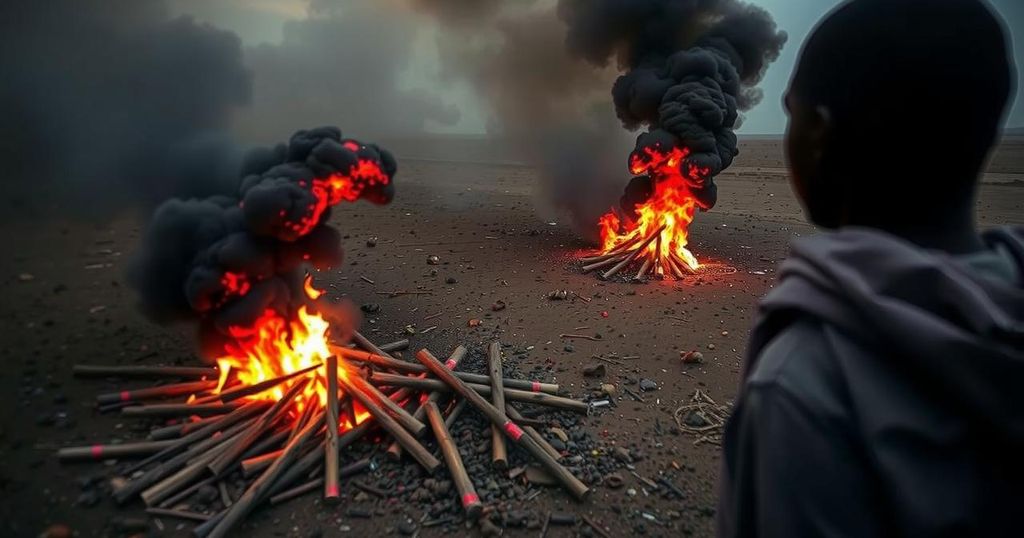The United Nations has expressed deep concern over the pervasive sexual violence in Sudan amid an ongoing civil war, which has resulted in numerous deaths and millions displaced. A report from the UN highlights how militias, primarily the Rapid Support Forces, have abducted women and girls for sexual slavery, while men and boys also face horrific sexual violence. The appeal for humanitarian aid remains significantly underfunded, as the world’s attention is diverted elsewhere.
The ongoing civil war in Sudan, now in its eighteenth month, has resulted in tens of thousands of deaths and millions of individuals displaced, amidst severe famine and rampant diseases. This crisis, one of the gravest globally, is increasingly overlooked as the international community shifts its focus toward conflicts in the Middle East. Compounding the humanitarian catastrophe, a recent 80-page report from the United Nations Independent International Fact-Finding Mission for Sudan reveals alarming levels of sexual violence perpetrated primarily by militias against women and girls. This report holds both the Sudanese Armed Forces (SAF) and the Rapid Support Forces (RSF) accountable for horrific acts of sexual violence. The findings illustrate a pervasive pattern of sexual violence and human rights violations, with victims ranging from ages 8 to 75. Many Sudanese women and girls are reported as abducted for sexual slavery, predominantly at the hands of the RSF, which is alleged to be responsible for the majority of these crimes. The violence does not spare men and boys, as accounts of rape and gang-rape have also surfaced. The dire situation is worsened by a critical lack of medical facilities; the ongoing conflict has resulted in widespread destruction of hospitals and clinics, leaving many victims without necessary medical care. Chair of the fact-finding mission, Mohamed Chande Othman, expressed grave concern stating, “The sheer scale of sexual violence we have documented in Sudan is staggering … [the situation] is deeply alarming and needs urgent address.” Human rights advocates have echoed these sentiments, highlighting an alarming trend where women, facing severe atrocities, choose to take their own lives as either a response to trauma or as an alternative to enduring ongoing violence. The roots of this conflict can be traced back to April 2023, following an escalating power struggle between the SAF and RSF that ultimately erupted into a full-scale war. Recent reports indicate that conflicts particularly in east-central Sudan have resulted in the deaths of over a hundred individuals, with the RSF accused of targeting civilians, committing sexual assaults, and engaging in looting activities. U.N. Secretary-General António Guterres stated, “The people of Sudan are living through a nightmare of violence… the suffering is growing by the day, with almost 25 million people now in need of humanitarian assistance.” However, international aid has fallen short, with less than half of the U.N.’s $2.7 billion humanitarian appeal for the region fulfilled, leaving Sudan, amidst its severe humanitarian crisis and particularly critical famine, feeling largely neglected on the global stage.
Sudan is currently embroiled in a brutal civil war that began in April 2023 due to a power struggle between the Sudanese Armed Forces and the Rapid Support Forces. The conflict has led to widespread violence, including severe human rights violations such as systemic sexual violence. The humanitarian situation is exacerbated by widespread physical destruction of health infrastructure and a lack of international support, making it one of the most urgent crises today.
The situation in Sudan is both dire and urgent, with rampant sexual violence and a humanitarian crisis that is largely overlooked by the world. The U.N. and human rights advocates emphasize the need for immediate international attention and action to address the atrocities being committed against the country’s vulnerable populations. It is essential for the international community to not only acknowledge the crisis but also to take concrete steps towards providing necessary humanitarian aid and support to the affected areas.
Original Source: www.foxnews.com






